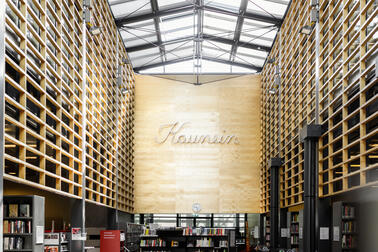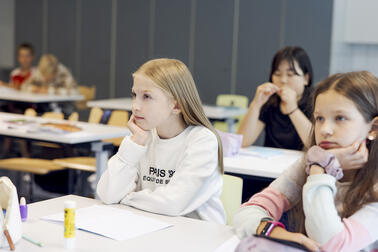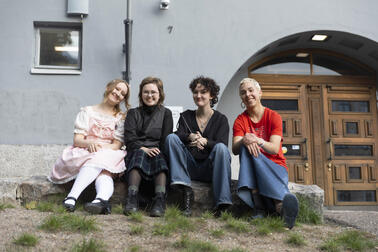
Some upper secondary schools in Finland have traditionally welcomed incoming students into the school community with informal rituals involving humiliation, oppression and even violence. Second-year students have organised these initiations (“nasujaiset” in Finnish) outside school hours and premises, which has made it impossible for the schools to intervene. The City of Helsinki and the local upper secondary schools themselves have nothing to do with these off-site initiations.
“We have no part in this tradition and we are appealing to the students to refrain from taking part in these kinds of initiations in their free time,” says Harri Korhonen, Director of Upper Secondary Education, Vocational Education and Liberal Adult Education for the City of Helsinki.
Rotten food thrown at people
In order to shed a light on the kind of hazing that has taken place in the past, a former upper secondary school student in Helsinki shares a story of an initiation from a few years prior. After the school day, the young people assembled in a park in front of the school.
“The second years wore military uniforms, the third years wore togas and the first years wore bad clothes because we knew that they would be ruined. They cut our clothes with scissors – making openings in the seat of our pants, for example. The humiliation began right away and was somewhat sexual in nature.”
The day continued on the exposed rock face near the Töölö Sports Hall where spoiled food was thrown at the first years. The student recalls trying not to breathe to keep from vomiting.
“Everything was as bad smelling as possible and left a really revolting feeling. Eggs, dog food, ketchup and spoiled foodstuffs had been mixed in buckets. First, they threw the wet foods on us and then some flour.”
The older students also used water guns to squirt vinegar at the younger students, many of whom got it in their eyes.
“I had just moved to the city and had no friends at school just yet. I wanted to participate to get to know people. Even though I consider myself very social, I was very distressed in the situation.”
The incoming first-year students were also forced to move condoms filled with eggs and dog food from mouth to mouth. The older students also shot alcohol in the initiates’ mouths with water guns.
The first years next had to crawl in a line from the Töölö Bay to the Narinkkatori Square in Kamppi. This was painful since the knees had been cut out from their trousers. Once they arrived at the square, the first-year students were forced to yell inappropriate things and get on their knees to swear loyalty to the older students.
Peer pressure is a key element of the initiation, forcing young people to do things they would not normally do.
“I walked back to school alone after the event and felt really drained. I was in survival mode – I just wanted to get home. I was exhausted from the 4–5 hours of continuous humiliation.”
“Every person is important”
The informal initiation tradition is a ritual of sorts for accepting people into a community. There is however no reason for the ritual to be humiliating or frightening.
“The initiations impact the experiences of students as members of the upper secondary school community. We would like to emphasise that every person is important. This is why we are telling students not to organise their own events in their free time because we are already arranging welcoming events at the schools,” says Tarja Aro-Kuuskoski, Head of Upper Secondary School Education for the City of Helsinki.
Most students do not want to be involved in hazing. Yet, incidents took place last autumn that later led to police investigations – and even crime reports.
The Helsinki Police annually monitor the start of the school year and the get-togethers of young people across the city parks.
“To the police, some of the initiations emerge as events that involve humiliation and littering in a public space. There are also some incidents that meet the criteria of minor assault, at the very least. For example, throwing a raw egg at someone’s head from a few metres away will absolutely cause pain. This can be regarded as assault or, at the very least, minor assault,” says Chief Investigator Katja Nissinen of the Helsinki Police Department.
The police cannot ban initiations, even though they always cause disturbances. Generally speaking, Nissinen believes it to be a good thing that young people organise events together but, in the worst-case scenario, these events can be dangerous or distressing to the participants. Another issue is that they may involve minors consuming intoxicants.
Last year’s initiations led to the report of several property crimes and crime reports associated with the robbery and assault of a few young people in Helsinki parks during the same weekend.
“The traditions must be rebuilt”
It is important that events that start the school year create a sense of community and team spirit.
“It is difficult to understand why the initiation has to involve humiliation. It could be a positive event that challenges students to participate in competitions, for example. In any case, they should never be events that would require a police response,” Chief Investigator Nissinen emphasises and adds:
“Sometimes when traditions become outdated, they must be rebuilt.”
She herself went through a hazing initiation during her upper secondary school days. The theme was a slave market, and the student that “bought” her dressed her up in revealing clothes.
“I had to complete a variety of tasks throughout the day while wearing a tiny black dress. This would not be in any way acceptable today. I don’t remember that the initiation made me feel as if I was part of the community. It was not fun, and it is also not something I remember fondly from those years.”
The former student who we interviewed also took part in the initiation the following year, but this time as one of the older students abusing the younger ones. In a way, it comes down to a vicious cycle of revenge that should be broken.
“You feel terrible afterwards, having been involved in something like this. I’d like to apologise to the people I abused.”
The student feels that the initiation can be a traumatic experience for those who have experienced sexual or other violence before in their lives. Many may also be left living in fear of photos or videos of the events popping up later in social media.
“It is really important to emphasise to all students that they do not need to participate in the initiations, and to provide substitutive activities,” the former student says.
Young people are welcome in the city
As a rule, large scale get-togethers in Helsinki’s parks are discouraged. At the start of each school year, the police have often had to clear parks in Helsinki because there have been up to 1,500 young people present. Large masses of people often lead to hazardous situations and accidents, and monitoring such groups takes up important police resources.
“Someone may be in great peril and in need of assistance elsewhere,” Nissinen says.
It is also important for parents and guardians of minors in particular to know that upper secondary school initiations often include intoxicants and there is a risk that things can get out of hand. Peer pressure makes it difficult for young people to say no.
The police would like to remind people that events associated with the start of the new school year may not include intoxicants or any form of humiliation or oppression. Crimes of any nature are strictly prohibited. All public areas must also be cleaned of any litter or waste immediately.
To finish, the City of Helsinki would like to emphasize that young people are welcome to spend time together anywhere in the city and that the beginning of the school year is a good time to meet new people and do fun things with others.


